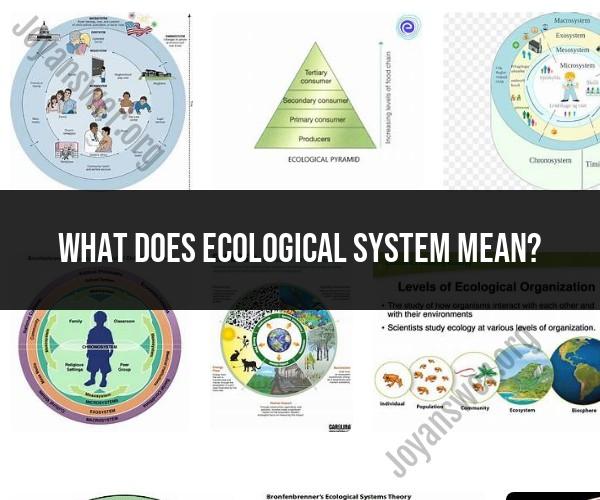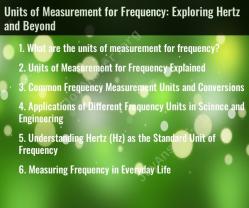What does ecological system mean?
An ecological system, also known as an ecosystem, refers to a community of living organisms (plants, animals, and microorganisms) in conjunction with the non-living components of their environment (such as air, water, soil, and climate) interacting as a functional unit. Ecological systems can vary in size, from small microenvironments like a pond or a forest floor to large-scale ecosystems like a tropical rainforest or a desert.
Key characteristics and concepts associated with ecological systems include:
Interdependence: Ecological systems are characterized by the interconnectedness and interdependence of their components. Organisms within an ecosystem rely on each other for resources and energy. For example, plants convert sunlight into energy through photosynthesis, which herbivores consume, and then carnivores may consume the herbivores. This interconnectedness forms complex food webs and nutrient cycles.
Biotic and Abiotic Factors: Ecological systems consist of both biotic (living) and abiotic (non-living) factors. Biotic factors include all the organisms within the ecosystem, while abiotic factors encompass elements like temperature, precipitation, soil composition, and sunlight. Both biotic and abiotic factors influence the dynamics of an ecosystem.
Energy Flow: Energy flows through ecological systems, typically originating from the sun (solar energy). Producers, such as plants, capture this energy through photosynthesis and convert it into chemical energy. This energy is then transferred through the ecosystem as organisms consume each other.
Nutrient Cycling: Nutrients, like carbon, nitrogen, and phosphorus, are essential for life and are cycled through ecosystems. Decomposers play a crucial role in breaking down organic matter, returning nutrients to the soil, which plants can then use for growth.
Adaptations: Organisms within ecological systems often develop specific adaptations to their environment to survive and reproduce. These adaptations may include physical characteristics, behaviors, or life cycle strategies tailored to their ecological niche.
Succession: Ecological systems can change over time through a process called ecological succession. Primary succession occurs on bare, lifeless surfaces (like a newly formed volcanic island), while secondary succession occurs in areas where an ecosystem has been disturbed (like a forest recovering from a fire).
Resilience and Vulnerability: Ecological systems exhibit varying degrees of resilience, which is their ability to recover from disturbances. Some ecosystems are more resilient than others, while some are highly vulnerable to disruptions, such as human activities like deforestation or pollution.
Biodiversity: The variety of species within an ecosystem is a critical component of its health and stability. High biodiversity often contributes to ecosystem resilience and functionality.
Human Impact: Human activities, such as deforestation, pollution, habitat destruction, and climate change, can significantly impact ecological systems. Understanding these impacts is essential for sustainable management and conservation efforts.
Overall, ecological systems are dynamic and complex, and they play a fundamental role in supporting life on Earth. The study of ecological systems is crucial for understanding the natural world, conserving biodiversity, and addressing environmental challenges.
Decoding Ecological Systems: What Does It Mean?
An ecological system is a community of living organisms and their physical environment interacting as a unified whole. It is a complex and interconnected system in which all the elements play an important role.
Ecological systems can be of all sizes, from a small pond to an entire forest. They can also be simple or complex, depending on the number of different organisms and the interactions between them.
The Significance of Ecological Systems: A Closer Look
Ecological systems are essential for life on Earth. They provide us with food, water, air, and other resources that we need to survive. They also play an important role in regulating the climate, protecting biodiversity, and cleaning pollution.
Ecological systems are also important for our well-being. They provide us with opportunities for recreation, relaxation, and learning. They also help to connect us with nature and each other.
Grasping the Essence: The Meaning of Ecological Systems
The essence of ecological systems is that they are interconnected and interdependent. All the elements of an ecological system play an important role, and they all rely on each other for survival.
This interconnectedness is what makes ecological systems so resilient. When one part of the system is disturbed, the other parts can help to compensate and restore the balance.
However, ecological systems are also vulnerable to change. Human activities such as pollution, habitat destruction, and climate change can have a devastating impact on ecological systems.
It is important for us to understand the importance of ecological systems and to work to protect them. By doing so, we can ensure that future generations can enjoy the benefits that they provide.
Here are some examples of ecological systems:
- Forests
- Coral reefs
- Grasslands
- Wetlands
- Rivers and lakes
- Oceans
- Cities
- Farms
Ecological systems are essential for life on Earth. We need to protect them and the biodiversity they support.












